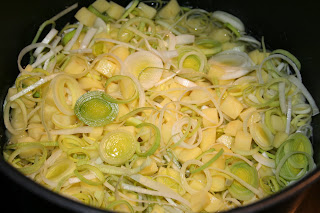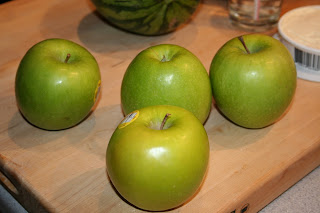New Look at Julia Child or How to Approach Learning
Cooking with Julia can be seen as insulting if the idea was to race through her cookbook, just completing recipes. Yes, the movie inspired by Julia and Julie was the final inspiration to start Julia Child's cookbook, Mastering the Art of French Cooking, but for any project to be meaningful, so much more is necessary. A strong desire to learn, patience, humility, scheduling, concentration, and allotting the right amount time in the right learning atmosphere are all part of how I am approaching the cookbook.
Each recipe takes time and concentration with a need to reread each recipe before starting, usually several times (Have you tried her recipes? I can honestly tell you there is a reason Julie must have had multiple meltdowns in the kitchen.) because Julia attacked every aspect of her cookbook with care and precision. She wants the cook looking at the recipe to understand why the step is necessary and what the home cook should be looking for while completing each step.
So here I am, wondering how to document my journey. Even giving myself time, I have made blunders like buying the wrong cut of beef (misread the label), trying to find veal, or getting steps confused (I rushed the recipe).
The aspic recipes are making my tummy do flip flops as well as the brains and other lovely recipes but we will do them and we will openly discuss the good and the not so good.
First Point: I am going to share what I have learned with each recipe.
Second Point (not yet fully decided): To get a full understanding of how to approach a main ingredient, a section should be completed at a time but just how much poultry can a family eat continuously?
I am hoping the rest will fall into place =).
Julia Child (Volume I ~ Mastering the Art of French Cooking)
Days Left: 298
Recipes to Go: 583
Leek and Potato Soup
Julia states how "leek and potato soup smells good, tastes good, and is simplicity itself to make". I think French people spend a lot of time in the kitchen. What we in America view as simple and what Julia views as simple are on opposite ends of the spectrum. Yes, the soup does not take large amounts of time but I had a sink full of dirty dishes to show for all the steps required to get the most flavor and texture (the soup is delicious) from the recipe. I do not believe I saw a dishwasher in Julia's kitchen but I could be wrong. Julia attacks a recipe to show scientific precision. I doubt she worried about how many dishes would go down in the effort.
Ingredients:
A 3- to 4-quart saucepan or pressure cooker (used pressure cooker)
3 to 4 cups or 1 pound peeled potatoes, sliced or diced (I diced)
3 cups or 1 pound thinly sliced leeks including the tender green; or yellow onions
2 quarts of water
1 Tablespoon salt
4 to 6 Tablespoons whipping cream or 2 to 3 Tablespoons softened butter
2 to 3 Tablespoons minced parsley or chives
Directions:
Either simmer the vegetables, water, and salt together, partially covered, for 40 to 50 minutes until the vegetables are tender; or cook under 15 pounds pressure for 5 minutes, release pressure, and simmer uncovered for 15 minutes.
Mash the vegetables in the soup with a fork, or pass the soup through a food mill. Correct seasoning. (*) Set aside uncovered until just before serving, then reheat to the simmer.
Off heat and just before serving, stir in the cream or butter by spoonfuls. Pour into a tureen or soup cups and decorate with the herbs.
Learning Point #1: The pressure cooker is still new to me and I am amazed at how easy and fast this method of tenderizing is.
Learning Point #2: Julia Child states that to puree a soup does not mean to take away the texture and create an end result resembling baby food. Blenders create just this type of texture; hence using the food mill or a fork.
Verdict: Loved the simple soup as a starter course for the meal (in place of a salad maybe) and thought the addition of minced parsley added elegance to the dish. This recipe is highlighted to be used for entertaining as a first course.
Scallops Gratineed with Wine, Garlic, and Herbs
Julia's recipe for these luscious scallops are fit to be a first course meal or the cook can double the ingredients and the dish will suffice for a main meal.
Serve a chilled Rose', or a dry white wine.
1/3 cup minced yellow onions
1 Tablespoon butter
1 1/2 Tablespoon minced shallot or green onions
1 clove minced garlic
1 1/2 pounds washed scallops
Salt and pepper
1 cup sifted flour in a dish
2 Tablespoons butter
1 Tablespoon Olive Oil
1 10-inch enameled skillet
2/3 cup dry white wine, or 1/2 cup dry white vermouth and 3 Tablespoons water
1/2 bay leaf
1/8 teaspoon thyme
6 buttered scallop shells, or porcelain or Pyrex shells, of 1/3 cup capacity
1/4 cup grated Swiss cheese
2 Tablespoons butter cut into 6 pieces
Directions:
Cook the onions slowly in butter in a small saucepan for 5 minutes or so, until tender and translucent but not browned. Stir in the shallots or onions, and garlic, and cook slowly for 1 minute more. Set aside.
Dry the scallops and cut into slices 1/4 inch thick. Just before cooking, sprinkle with salt and pepper, roll in flour, and shake off excess flour.
Saute the scallops quickly in very hot butter and oil for 2 minutes to brown them lightly.
Pour the wine, or the vermouth and water, into the skillet with the scallops. Add the herbs and the cooked onion mixture. Cover the skillet and simmer for 5 minutes. Then uncover, and if necessary boil down the sauce rapidly for a minute until it is lightly thickened. Correct seasoning, and discard bay leaf.
Spoon the scallops and sauce into the shells. Sprinkle with cheese and dot with butter.
(*) Set aside or refrigerate until read to gratine.
Just before serving, run under a moderately hot broiler for 3 to 4 minutes to heat through, and to brown cheese lightly.
Learning Point #1: This recipe follows suit with the rest of the recipes tried, devised for entertaining. I enjoy being able to calculate my time and know that I can prepare a dish in advance, refrigerate, then heat just before serving. This allows the host to enjoy her/his company and relax enough to enjoy the food as well.
Learning Point #2: The scallops were sliced thin and sauteed quickly. The flavor was tender, moist, and delicious. I would never have thought to slice a scallop into thin slices without taking something away from the seafood presentation.
Verdict: Scallops are one of my favorite seafoods' and this dish really brought out the flavor, adding a moist and tender texture. The dish surpasses any scallop dish ordered at a restaurant to date.











Comments